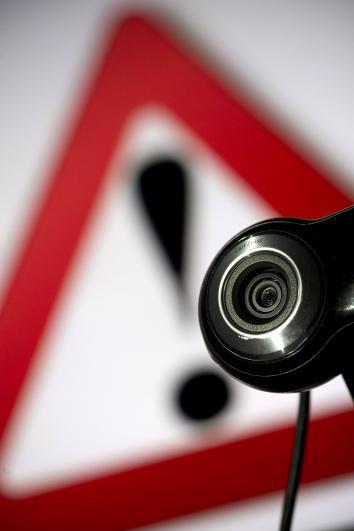Is your webcam recording you right now? If that little green light is off, you’d probably think the camera is, too. But think again. Wednesday, the Washington Post highlighted an unnerving study published at Johns Hopkins University which found that a laptop webcam can function in relative secrecy—a slightly subtler Eye of Sauron. Matthew Brocker and Stephen Checkoway’s paper, regrettably (though inevitably) titled “iSeeYou: Disabling the MacBook Webcam Indicator LED,” exposes the flaw in many Apple laptops built before 2008. But PC users shouldn’t rejoice—MacBooks are not the only devices at risk.
Webcam-spying—particularly the variant that involves disabling LED indicator lights—takes quite a bit of effort, but the practice isn’t limited to the realm of benevolent academics. The FBI has also publicly acknowledged its ability to employ such techniques when investigating criminal activity: Last year, a federal magistrate rejected the agency’s request to secretly monitor a suspected criminal through his webcam. The Chinese government used a program called Ghostnet—which involved remote access to webcams—to spy directly on the Dalai Lama, though it is not known whether or not they first disabled the indicator light. But it isn’t just governments who are co-opting webcams to do their surveillance work.
In 2010, high school administrators in Pennsylvania took more than 30,000 webcam images of students using remote access tools installed on school-issued laptops. Some students in the Lower Merion School District reported seeing the indicator light turn on with no explanation. And earlier this year, a 19-year-old man used covertly recorded webcam images of several women—including Miss Teen USA Cassidy Wolf—as part of an extortion effort, threatening to post nude images if his demands were not met. Wolf claims she never saw the indicator light when the images were being taken. But is it any less disturbing if the indicator light does turn on during a hacking attempt? Who hasn’t felt that brief pang of panic after unknowingly opening Photo Booth and seeing the LED light up?
With the right tools, in other words, almost anyone—from foreign governments to the creepy teenager down the street—could be recording you while you sit at your computer. All of this raises the question: Why don’t we just cover our webcams whenever they aren’t in use? Is this the digital equivalent of leaving the front door unlocked, or forgetting to check the deadbolt at night? The likelihood that burglars will sneak in is relatively low, but the simple click of a lock can make it much less likely.
Perhaps the time required to spy on another person seems tiring. After all, the majority of us spend several hours each day staring—often expressionlessly—at the computer screens in front of us. Do hackers have the patience to wait for us to put ourselves in a compromising pose? Disturbingly, the answer would seem to be yes.
Given the lurking threat of webcam snooping, why don’t we all just cover the camera with a sticky note and breathe easy? Aesthetic concerns, mostly. With laptops becoming ever thinner, sleeker, and sexier, nobody wants to mar their machine with Band-Aids and Post-Its. But never fear: Etsy offers multiple options for the fashion-conscious user, including stickers of that irritatingly ubiquitous mustache, a stylish crocheted ghost for older models, and twee animals for the kids. (I’m not sure the tagline “PROTECT YOUR FAMILY FROM CYBERATTACKS” is completely fair, but they will stop strangers from watching your children remotely, if that kind of thing alarms you.) Of course The Electronic Frontier Foundation offers slightly more modest covers for the tech-savvy consumer.
Of course this could all be solved with one simple design feature—a shutter—but it doesn’t seem to be a top priority for computer manufacturers. In the meantime, maybe it’s worth investing in a chic little cover-up for your webcam. You wouldn’t leave your door unlocked, or your email unprotected. Why leave your webcam so eminently accessible when a simple, only slightly paranoid solution is already at hand?
